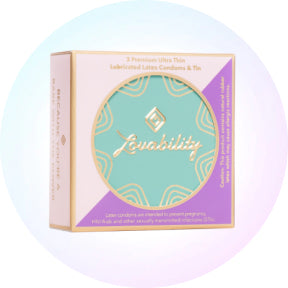Resources — Vulva Care
Yeast Infection And Sex
Hey there, fabulous ladies! Let's have a real talk about something many of us have experienced but might not always want to discuss – yeast infections after sex. Yep, we're diving deep into this topic to shed some light on why it happens, what causes it, and most importantly, what you can do to better protect yourself. So, grab your favorite cozy spot, snuggle in, and let's get started!
What Is A Yeast Infection?
First things first, let's break it down – what exactly is a yeast infection? A yeast infection, also known as candidiasis, is a common fungal infection that affects the vagina and vulva. It's caused by an overgrowth of yeast, specifically Candida albicans, which can lead to symptoms like itching, burning, and unusual discharge.
Is A Yeast Infection The Same As A UTI?
What Causes Yeast Infections?
Now, the big question – what causes yeast infections? Well, there are a few factors at play here:
-
Imbalance in Vaginal Flora: Your lady parts are home to a delicate balance of bacteria and yeast. When this balance gets thrown off, whether due to hormonal changes, antibiotics, or other factors, it can lead to an overgrowth of yeast and the dreaded yeast infection.
-
Sexual Activity: Yep – sex can sometimes be a culprit. The friction and movement during intercourse can disrupt the pH balance of the vagina, creating an environment where yeast can thrive.
-
Condom & Lubricant Use: Certain types of condoms and lubricants can contain ingredients that disrupt the vaginal flora and increase the risk of yeast overgrowth.
-
Oral Sex: Can you get a yeast infection from oral sex? While it's less common, it is possible. Yeast infections can occur in the mouth and throat, so if your partner has oral thrush (a yeast infection in the mouth), it's possible to transmit it to your lady bits during oral sex.
What Can I Do to Better Protect Myself from Getting Yeast Infections?
Now that we've covered why yeast infections after sex happen, let's talk about what you can do to lower your risk. Here are a few tips to help you stay happy, healthy, and yeast infection-free:
Before Sex:
-
Choose Your Sex Essentials Wisely: Opt for condoms that are free of spermicide, flavorings, and other harsh chemicals that can mess with your vaginal flora. For lubricants, look for a water-based lubricant formulated to the ideal osmolality. Avoid flavored lubes (especially if you are prone to infections), as they contain high sugar levels that feed the bacteria naturally found in the vagina, encouraging the growth of yeast; similarly, lubricants with glycerin have also been linked to an increased risk of developing a yeast infection.
-
Communicate with Your Partner: If you or your partner have a history of yeast infections, it's essential to communicate openly and discuss ways to minimize the risk. Consider using condoms or dental dams during oral sex to reduce the risk of transmission.
After Sex:
-
Practice Good Hygiene: After getting busy, gently clean your vulva with warm water and mild soap. A body-safe, pH-balanced vaginal wipe will help to refresh, sooth and moisturize your sensitive parts, but avoid harsh scrubbing or douching, as this can disrupt the natural balance down there.
-
Stay Dry: After washing up, make sure to pat yourself dry with a clean towel. Avoid hanging out in sweaty clothes or tight underwear that can trap moisture and create a breeding ground for yeast.
-
Consider Probiotics: Incorporating probiotics into your routine can help maintain a healthy balance of bacteria and yeast in your lady parts. Consider taking oral probiotic supplements or using probiotic suppositories specifically designed for vaginal health.
Can I Have Sex While I Have A Yeast Infection?
It is recommended that you wait until your infection and its symptoms have cleared before you have sex, usually between a few days and a week. Along with the fact that yeast infections may be passed back and forth with your partner, sex may slow down the healing process.
So, there you have it, lovely ladies – a guide to understanding yeast infections after sex and what you can do to protect yourself. Remember, your vaginal health is important, and taking care of yourself means prioritizing your well-being in all aspects of life, including sex. Here's to happy, healthy lady bits and plenty of worry-free fun between the sheets!
Best Feminine Hygiene Practices for the Vulva at Any Age
Feminine hygiene is a crucial aspect of overall health and well-being for individuals of all ages. The vulva, the external part of the female genitalia, requires special care to maintain cleanliness, comfort, and health.
From adolescence through adulthood and beyond, practicing good feminine hygiene habits can help prevent infections, discomfort, and other issues. In this guide, we'll explore the best feminine hygiene practices for the vulva at any age, empowering individuals to prioritize their intimate health with confidence and care.
Understanding the Vulva
Before delving into feminine hygiene practices, it's essential to understand the anatomy of the vulva. The vulva includes the outer lips (labia majora), inner lips (labia minora), clitoris, vaginal opening, and urethral opening. Get to know your vulva, as each part plays a unique role in sexual pleasure, reproduction, and bodily functions.
1. Gentle Cleansing
Knowing how to clean your vulva is vital for preventing irritation and infection. However, it's essential to use gentle cleansing methods to avoid disrupting the natural balance of the vaginal ecosystem. Use warm water to cleanse the vulva externally, focusing on the folds and creases. If you wish to use a soap, use only a mild, hypoallergenic, pH-friendly, fragrance-free soap; avoid using harsh soaps, douches, or scented products, as they can disrupt the pH balance and lead to irritation or infection.
2. Proper Wiping Technique
When using the bathroom, always wipe from front to back after urination or bowel movements. The same advice goes if you're freshening up down there with a personal wipe. This helps prevent the spread of bacteria from the anus to the vagina, reducing the risk of urinary tract infections (UTIs) and other infections. Avoid excessive wiping, as it can cause irritation and discomfort.
3. Wear Breathable Underwear
Choosing the right underwear is essential for vulvar health. Opt for breathable, cotton underwear that allows air circulation and helps absorb moisture. Avoid tight-fitting underwear made of synthetic materials, as they can trap heat and moisture, creating an environment conducive to bacterial growth and infections.
4. Practice Safe Sex
Practicing safe sex is crucial for protecting vulvar health and preventing sexually transmitted infections (STIs). Use condoms consistently and correctly during vaginal, anal, and oral sex to reduce the risk of STIs. If using lubricants, opt for water-based or silicone-based options to avoid disrupting the vaginal pH balance.
5. Change Pads and Tampons Regularly
During menstruation, it's essential to change pads and tampons regularly to maintain vulvar hygiene and prevent odor and discomfort. Change pads every 4-6 hours or as needed, and change tampons every 4-8 hours to reduce the risk of bacterial overgrowth and infections. Consider using organic or fragrance-free menstrual products to minimize irritation.
6. Practice Good Hygiene During Menopause
As women transition through menopause, hormonal changes can affect vaginal health and moisture levels. A good tip to alleviate menopause symptoms, practice good hygiene by gently cleansing the vulva with water or a mild, fragrance-free cleanser, and moisturize the external genital area as needed to reduce dryness and discomfort. Use an arousal balm before sex to stimulate lubrication - or a water-based lubricants during sex - to reduce friction and discomfort.
7. Regular Gynecological Exams
Regular gynecological exams are essential for maintaining vulvar health and detecting any potential issues early on. Schedule regular pelvic exams and Pap smears with a healthcare provider to monitor vaginal health, screen for cervical cancer, and address any concerns or symptoms promptly.
_____________________________________
Practicing good feminine hygiene habits is essential for maintaining vulvar health and overall well-being at any age. By following these best practices, individuals can prioritize their intimate health with confidence and care, empowering themselves to live their best lives. Remember, taking care of the vulva is an important part of self-care and overall health, and it's never too late to start practicing good feminine hygiene habits.









